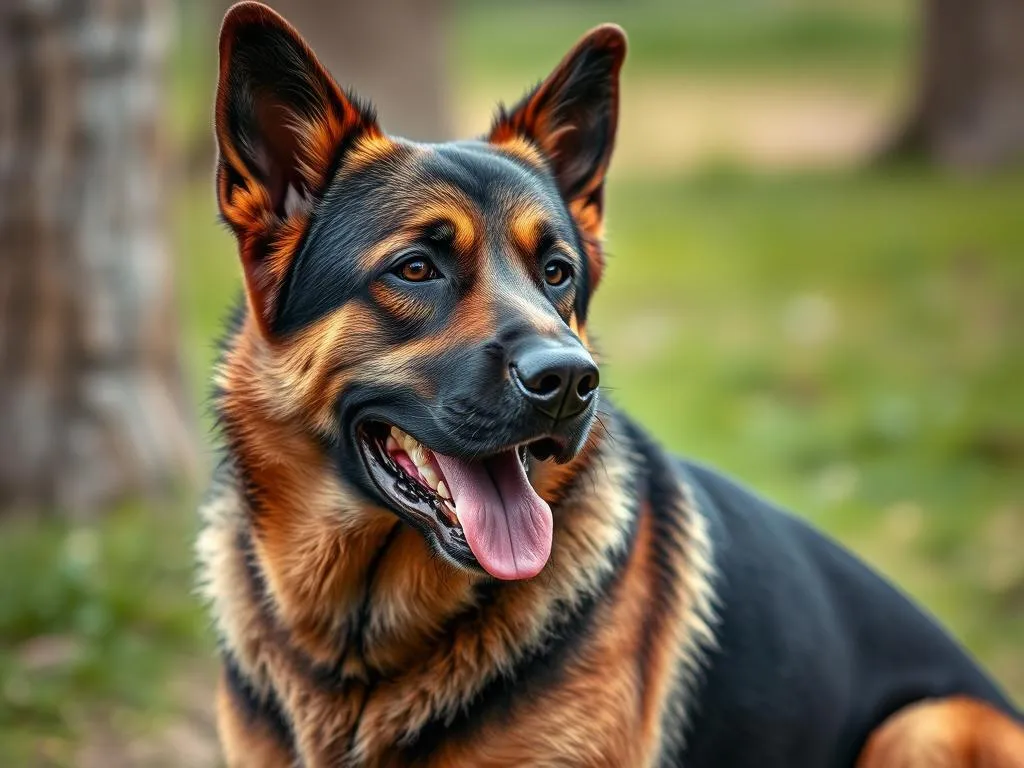
The German Shepherd Rottweiler mix is an intriguing blend of two powerful and intelligent breeds. Mixed dog breeds like this one often inherit a unique combination of traits from their parent breeds, making them fascinating companions for dog lovers. Understanding the characteristics, care requirements, and training needs of this mix can help potential owners make an informed decision about welcoming one into their home.
Understanding the Parent Breeds
German Shepherd
The German Shepherd originated in Germany in the late 19th century as a herding and working dog. They were developed for their intelligence, strength, and versatility. Today, German Shepherds are known for their loyalty and are frequently employed in various roles, including police and military work, service dogs, and family companions.
Key Traits:
– Intelligence: German Shepherds are among the most intelligent dog breeds, making them highly trainable.
– Loyalty: They form strong bonds with their families and are known to be protective of their loved ones.
– Versatility: Their adaptability allows them to thrive in various environments and roles.
Common Health Issues:
German Shepherds are prone to certain health conditions, including hip dysplasia, elbow dysplasia, and degenerative myelopathy. Regular veterinary check-ups are essential to monitor their health.
Rottweiler
The Rottweiler has a rich history, tracing back to the Roman Empire when they were used as herding and guard dogs. They are known for their strength and confidence, which make them excellent protectors. While Rottweilers can appear intimidating, they are also known for their affectionate nature towards their families.
Key Traits:
– Strength: Rottweilers are muscular and powerful, which contributes to their protective instincts.
– Confidence: They possess a natural self-assurance, making them effective guard dogs.
– Protective Nature: Rottweilers are fiercely loyal and protective of their families.
Common Health Issues:
Rottweilers can be susceptible to health problems, such as hip and elbow dysplasia, heart issues, and certain types of cancers. Regular health screenings are vital for early detection.
Characteristics of the German Shepherd Rottweiler Mix
Physical Appearance
The German Shepherd Rottweiler mix typically inherits physical characteristics from both parent breeds.
- Size and Weight Range: This mix can vary significantly in size, generally weighing between 70 to 100 pounds and standing around 22 to 27 inches tall.
- Coat Types and Colors: They often have a short to medium-length coat that can be black and tan, black and gold, or even brindle, depending on the dominant genes.
- Distinctive Features: You may notice a blend of the German Shepherd’s erect ears and the Rottweiler’s stocky build in the mix, resulting in a striking appearance.
Temperament
The temperament of the German Shepherd Rottweiler mix tends to reflect the loyal and protective nature of both breeds.
- General Behavior: This mix is usually confident, intelligent, and eager to please. They thrive on companionship and enjoy being part of the family.
- Socialization Tendencies: Early socialization is crucial to help them grow into well-adjusted adults. They can be wary of strangers but are typically friendly with family and familiar people.
- Compatibility: This mix can be good with children and other pets if properly socialized, but supervision is always recommended, especially around smaller animals.
Health Considerations
Common Health Issues
Being a mix of two breeds, the German Shepherd Rottweiler mix can inherit health issues from both parent breeds.
- Genetic Predispositions: Common issues include hip and elbow dysplasia, heart problems, and certain cancers. Regular vet visits can help manage these risks.
- Importance of Regular Veterinary Check-Ups: Regular health screenings are essential for early detection and management of potential health issues.
Lifespan and Care
The average lifespan of the German Shepherd Rottweiler mix ranges from 10 to 13 years.
- Preventative Care: Routine vaccinations, a balanced diet, and regular exercise are vital to ensuring a long and healthy life.
- Health Maintenance Tips: Monitoring their weight and being proactive about any changes in behavior can help catch health issues early.
Training and Socialization
Training Basics
Early training is critical for the German Shepherd Rottweiler mix due to their intelligence and strong will.
- Importance of Early Training: Starting training early can help shape their behavior and strengthen the bond between owner and dog.
- Recommended Training Methods: Positive reinforcement techniques, such as praise, treats, and playtime, are effective in training this mix.
- Challenges: Some individuals may exhibit stubbornness, necessitating patience and consistency during training sessions.
Socialization Needs
Socialization plays a vital role in developing a well-rounded dog.
- Importance of Socialization: Exposing your mix to various environments, people, and other animals can help reduce anxiety and prevent behavioral issues.
- Best Practices for Socializing: Regular trips to dog parks, obedience classes, and playdates with other dogs can foster positive social interactions.
- Potential Behavioral Issues: Lack of socialization may lead to fearfulness or aggression, making it crucial to prioritize this aspect of their upbringing.
Exercise and Activity Requirements
Daily Exercise Needs
The German Shepherd Rottweiler mix is an active breed that requires regular exercise to thrive.
- Recommended Types of Exercise: Daily walks, play sessions, and mental stimulation activities like puzzle toys or training exercises are ideal.
- Importance of Mental Stimulation: Engaging their minds helps reduce boredom and destructive behaviors.
Ideal Living Conditions
This mix does best in environments that cater to their exercise needs.
- Space Requirements: While they can adapt to apartment living, they thrive in homes with yards where they can run and play.
- Outdoor Space Needs: Access to outdoor space is crucial for their physical and mental well-being.
Nutrition and Diet
Dietary Needs
A balanced diet is essential for the health of the German Shepherd Rottweiler mix.
- Recommended Diet Types: High-quality dry kibble, wet food, or a raw diet can be suitable. Consult your veterinarian for recommendations.
- Importance of High-Quality Food: Nutrient-rich food helps maintain their overall health and energy levels.
Feeding Guidelines
Proper feeding practices can prevent obesity and ensure a healthy weight.
- Portion Sizes: Adjust portion sizes based on age, weight, and activity level. Puppies and active dogs need more food than older or less active dogs.
- Managing Weight and Obesity: Regular exercise combined with a controlled diet helps maintain a healthy weight.
Grooming and Maintenance
Coat Care
Grooming is an essential part of caring for the German Shepherd Rottweiler mix.
- Shedding Patterns: This mix typically sheds moderately year-round, with heavier shedding during seasonal changes.
- Grooming Frequency: Regular brushing (at least once a week) helps manage shedding and keeps their coat healthy.
Other Grooming Needs
Besides coat care, other grooming tasks are necessary.
- Bathing Practices: Bathe your dog as needed, usually every few months, or when they get particularly dirty.
- Nail Trimming and Dental Care: Regular nail trimming and dental hygiene are vital for overall health.
Pros and Cons of Owning a German Shepherd Rottweiler Mix
Advantages
Owning a German Shepherd Rottweiler mix comes with numerous benefits.
- Loyalty and Companionship: They are known for their loyalty and can be incredibly affectionate companions.
- Versatility in Roles: This mix can serve as a family pet, service dog, or even a guard dog, adapting to various roles.
Disadvantages
However, there are challenges to consider.
- Potential for Health Issues: The mix can inherit health problems from either parent breed, necessitating regular veterinary care.
- Need for Consistent Training and Socialization: Ongoing training and socialization are crucial for a well-behaved dog, requiring time and commitment from the owner.
Conclusion
The German Shepherd Rottweiler mix is a remarkable dog that combines the intelligence and loyalty of the German Shepherd with the strength and protective nature of the Rottweiler. Understanding their needs for exercise, training, and socialization is key to ensuring their well-being. Potential owners should consider their lifestyle and commitment before bringing one of these dogs into their home, as they offer a wealth of companionship and joy for those willing to invest the time and effort.
FAQs
What is the temperament of a German Shepherd Rottweiler mix?
This mix typically exhibits a confident, loyal, and intelligent temperament, making them great family companions when properly trained and socialized.
How much exercise does a German Shepherd Rottweiler mix need?
They require daily exercise, including walks, playtime, and mental stimulation, to stay healthy and happy.
Are German Shepherd Rottweiler mixes good with children?
Yes, they can be good with children when socialized properly. Supervision is recommended, especially around younger kids.
What health issues should I watch for in this mix?
Common health issues include hip dysplasia, elbow dysplasia, and heart problems. Regular veterinary check-ups are essential for early detection.
What type of diet is best for a German Shepherd Rottweiler mix?
A high-quality diet rich in nutrients is recommended, along with portion control based on age and activity level to maintain a healthy weight.









